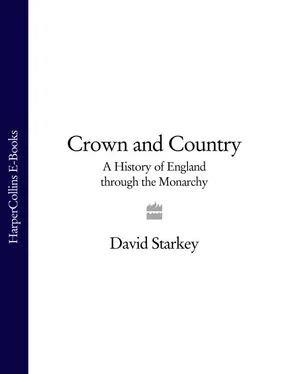On the other hand, Englishmen played an important role in the Carolingian achievement and one, Alcuin, who was born in Northumbria and educated at York, was a central figure in the regime as a sort of minister for culture and education. Finally, Offa’s takeover of the southeast of England brought him into close and direct commercial contact with Francia . This is why he modelled his changes in the currency on Pepin’s monetary reforms. Pepin also provided the ultimate model for Ecgfrith’s anointing. But there was a more immediate input since Alcuin, acting as envoy from Charlemagne, had accompanied the papal legates on their mission to England in 786. He played a major part in the ensuing Church Council; probably attended Ecgfrith’s coronation and returned to England on another diplomatic errand a few years later. Alcuin’s correspondence thus provides a sort of commentary on the apogee of Offa’s power and on the nemesis which followed soon after.
At first, all seemed well. Offa was, Alcuin wrote in one letter, ‘the glory of Britain’; in another, he saw him as having ‘the kingdom … of all the English’ within his grasp. And in Ecgfrith he had provided a worthy heir. Alcuin called the boy ‘my son’; enjoined him to learn ‘authority’ from his father and ‘compassion’ from his mother and saw him as ‘the hope of many’. It is not hard to see why. For, irrespective of Ecgfrith’s personal qualities, Alcuin interpreted his anointing, which he may have helped to devise, as the promise of a new, better monarchy: more ordered, more Christian and better attuned to its responsibilities to the people of God. In short, Alcuin seems to have hoped that the ceremony of 787 would lead to a renewed kingdom of the English, just as the Carolingian revolution had restored the kingdom of the Franks and would, in the fullness of time, revive the Roman Empire itself.
But it was not to be. Offa died on 29 July 796. Ecgfrith duly succeeded. But he died less than six months later, on 17 December. The hopes had been cheated and ‘the divinity that doth hedge a king’ had failed at its first English test. Alcuin was forced to ask why. His answer was that the sins of the father had been visited on the son. ‘For you know very well’, he wrote to a leading Mercian noble, ‘how much blood his father shed to secure the kingdom on his son.’
There were sins of omission on Offa’s part as well. Though Alcuin had expressed his delight that Offa was ‘so intent on education’, there is no evidence that it came to very much. Certainly, there is nothing to compare with the Carolingian or the Northumbrian achievement: there is no Mercian renaissance or chronicle, no Life of Offa , no writings by the king himself. In short, if Offa were attracted to ideas of empire, it was to imperium in its simplest, crudest sense as the mere absoluteness of power. His conquest of the south-east, his construction of Offa’s Dyke, his bloodlettings and regicides can all be read as embodying that. But it was not enough. Indeed, in the Anglo-Saxon political tradition, it may have been worse than useless. Or, in Alcuin’s own words: ‘this was not a strengthening of the kingdom but its ruin’.
But we must not anticipate. The man who emerged victorious from the power struggle which followed the royal deaths of 796 was Cenwulf. He, at best, was only a distant member of the royal kindred. But his style was pure Offa, as his treatment of Kent shows. The Kentishmen took advantage of the succession crisis and the consequent temporary eclipse of Mercian power to rebel and erect a certain Eadbert as their own king once more. But Cenwulf exacted a terrible revenge. The revolt was suppressed and Eadbert taken to Mercia. There he was ritually mutilated to disable him from kingship: his eyes were put out and his hands cut off. Not surprisingly, Kent subsequently remained quiet, though Cenwulf in turn made some concession to local pride by setting up his brother Cuthred as puppet-king of Kent.
Cenwulf himself died in 821. His death was followed by another, even more drawn-out struggle for the succession, which once more gave Mercia’s enemies, internal and external alike, their opportunity. And this time the whole edifice of Mercian imperial power was brought crashing down. Fittingly, the man who struck the decisive blow was another victim of Offa’s, Egbert.
Egbert was a scion of the royal house of Wessex. Somehow he had fallen foul of Offa, and, like many others, had fled ‘in fear of death’ to take refuge in Francia at the court of Charlemagne. But in 802, after the death of Offa’s son-in-law King Beorhtric, Egbert the exile returned to succeed effortlessly to the throne of Wessex. Now, twenty years later, Cenwulf ’s death offered him the opportunity to avenge the slights he had suffered at Mercian hands. The year 825 was his annus mirabilis : Egbert himself defeated the new Mercian king Beornwulf at Ellendun ; the East Anglians then rose against Mercian domination and killed Beornwulf as he tried to suppress the revolt; meanwhile, Egbert’s son, Æthelwulf, occupied the remaining provinces of the former Mercian empire in Sussex, Kent and Essex, and, by some at least, was greeted as liberator. Four years later, Egbert scaled fresh heights: he conquered Mercia and marched against the Northumbrians, defeating them in battle and receiving submission and tribute.
A new great power had arisen in England: Wessex. But it would have to confront a new and even greater threat: the Vikings.
Конец ознакомительного фрагмента.
Текст предоставлен ООО «ЛитРес».
Прочитайте эту книгу целиком, купив полную легальную версию на ЛитРес.
Безопасно оплатить книгу можно банковской картой Visa, MasterCard, Maestro, со счета мобильного телефона, с платежного терминала, в салоне МТС или Связной, через PayPal, WebMoney, Яндекс.Деньги, QIWI Кошелек, бонусными картами или другим удобным Вам способом.












